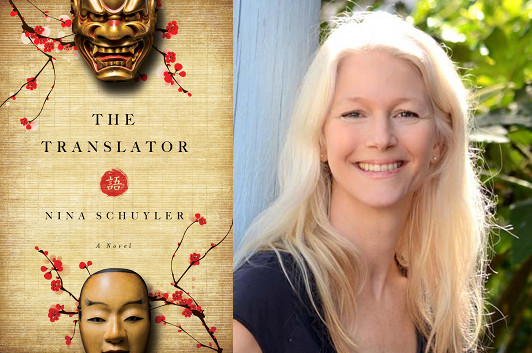Nina Schuyler Has Translation on the Brain

photo: Cristina Taccone
As Nina Schuyler explains below, the protagonist of her new novel, The Translator, thinks she understands the Japanese novel she’s rendering into English, but she may be looking at it from a skewed perspective. What happens when the rest of her life is thrown into disarray by a brain trauma that takes away her ability to speak English—but leaves her fluent in Japanese? That would be telling, of course… but I can share Schuyler’s insights into what drew her, as a novelist, to this captivating premise.
In 2005, The New Yorker published an article by David Remnick, “The Translation Wars,” about a married couple that was busy re-translating all the great Russian novels into English: Richard Pevear, an English speaker, and his wife, Larissa Volokhonsky, a Russian émigrée. Finally, what Nabokov called a “complete disaster” and “the dry shit” of Constance Garnett, who had first translated Russian literature into English, could be set aside.
What caught my eye wasn’t the word “Translation” in the title of the article, but the words “Tolstoy” and “Dostoyevsky” in the subtitle. As a girl, I fell in love with Dostoyevsky, Tolstoy, Chekhov, and Pasternak. I remember one summer when I was twelve, I carried Doctor Zhivago every day to the pool. Back then, I didn’t even consider that the stories were first written in Russian—what Thomas Mann called “the muddy, barbaric, boneless tongue from the East.” What I thought about was snow, sleigh rides, passion, betrayal, revolution, peasants, czars, love.
Constance Garnett was, in fact, English. In 1891, when she had a difficult pregnancy, she taught herself Russian. Soon she began translating. According to Remnick, when she came across a word or phrase she didn’t know, she merrily skipped it and moved on. She was not skilled enough to carry forth certain verbal motifs and complicated sentences.
I went to my bookshelf. My Russian literature—all Garnett’s translations! Watered down, corrupted translation, soaked in a heavy dose of English custom and sensibility. As all writers learn, conflict makes for story. The New Yorker article presented itself to me as a seed for a story: What if a translator thinks she did a superior job, as Garnett most likely did, but, in fact, mangled the job?
11 November 2013 | guest authors |
Susan Reinhardt’s Southern Chimes

photo: Randy Whittington
I’ve known Susan Reinhardt for a few years now, since we met at one of Kathy Patrick’s Pulpwood Queens Girlfriend Weekend literary festivals out in Jefferson, Texas. She recently sent me a copy of her new novel, Chimes from a Cracked Southern Belle, and told me a bit about how, after facing a round of “we’d love to but…” rejections from New York publishers, she found a publishing company in her hometown of Asheville, North Carolina, willing to simply say “we’d love to.”
Telling that story below, she compares Chimes to the novels of Billie Letts, and as I was reading it, I was also reminded of another really wonderful contemporary southern writer, Michael Lee West. I’m really excited to see Susan taking charge of her literary destiny like this; she’s got a fun, sassy voice that could never have been stilled for very long.
I always knew I wanted to write a novel, but life and kids and the day job as a columnist and reporter just seemed to get in the way. One day I told myself, if I write a page a day, I’ll have a novel in a year. Let’s just say that novel was so-so and is in a box somewhere in my basement, probably festering with dead bug carcasses.
Over the next few years, I took this craft more seriously and studied the best writers, enrolled in fiction classes and read many books on how to write the Great American novel. I had a decent draft of Chimes from a Cracked Southern Belle, then under a different title, and submitted it to New York’s top agents. After a bunch of rejections, three wanted to represent me, and I went with the one I felt best matched.
He tried to sell the novel. We got rejections that glowed like a supermoon. Even though I felt discouraged, a common angst among writers, I didn’t throw the dream in the dustbin. I told my agent I could write a collection of funny essays, and sent him about a dozen. Boom! He sold my non-fiction book to Kensington and landed a book deal for Not Tonight Honey Wait Til I’m a Size 6, which became a bestseller. I did two more books for Kensington, and then tried my hand once again at revamping the novel and re-submitting the work.
By then, I had a new agent, another stellar person believing in my book and even saying, “This could possibly go to auction.” Is that not the magic sentence every writer longs to hear?
19 August 2013 | guest authors |

 Our Endless and Proper Work is my new book with Belt Publishing about starting (and sticking to) a productive writing practice.
Our Endless and Proper Work is my new book with Belt Publishing about starting (and sticking to) a productive writing practice. 
